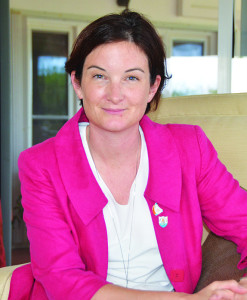 Over the past several days, Governor Christina Scott undertook to speak with media representatives in relation to her work in Anguilla during the first year of her appointment, and also gave a forward look at how her duties and responsibilities will continue to unfold.
Over the past several days, Governor Christina Scott undertook to speak with media representatives in relation to her work in Anguilla during the first year of her appointment, and also gave a forward look at how her duties and responsibilities will continue to unfold.
The Governor arrived in Anguilla on July 19, 2013, and was sworn in on July 23 in succession to Mr Alistair Harrison. She is the first female to be appointed to the diplomatic post on the island by the Foreign and Commonwealth Office.
Ms Scott stressed, at the outset of the press interview that, among her objectives is to open up Government House in a more tangible manner to various groups and individuals across Anguilla. “One of my aims is to make Anguillians feel that this is their Government House,” she stated. “This isn’t a Government House that is only for expats, governors and senior officials. It should be a building that celebrates the best of Anguillian culture right across the board and accessible to all, making people feel Government House is part of how they celebrate important cultural events and achievements.”
The Governor was asked whether, as some people feel, she was on a public relations mission in Anguilla. “I don’t see it as a mission,” she replied. “It is not an end in itself, but I think when I arrived there was a lot of uncertainty about what the Governor was here to do – and concern about the UK’s position towards the Overseas Territories. What I have been very keen to do was to try and explain where we are helping; the sorts of things we can do to support the things we care about. The Overseas Territories White Paper is very clear that we want to see them strive culturally, socially, economically. And so I want to celebrate and support those things that help us here in Anguilla.”
Questioned about whether she thought she would achieve that objective, she responded: “I hope so. I get some nice feedback from time to time, but I don’t think it is for me to judge. I think it is for Anguillians to tell me how they think I am doing; but I think they can only take an informed decision about the UK’s relationship with Anguilla if we tell them what we are doing. And, so putting much more information out in the public, and communicating with people through the route they like, is important. The social media is quite a powerful vehicle for us to explain the things that we are doing.”
Commenting further about the UK-Anguilla relationship, Ms Scott continued: “It shouldn’t be about the UK versus Anguilla which I think it was a bit when I arrived. It really needs to be about stressing the partnership. We are not always going to agree and to be able to provide all of the assistance that people would like; but we want to be as helpful and supportive as we can. I think changing the tone of the discussion between the Governor and the Government is something I have been quite pleased about because it has given us some space to have some more difficult conversations behind the scenes. I don’t think public hectoring – whether it is between the Governor and the Chief Minister or between the different political parties – is helpful to a sensible discussion about the future for Anguilla. ”
Governor Scott was asked what the UK Government had done through the Governor’s Office during her appointment. “The most obvious thing is the twelve million EC dollar grant that is in the budget for this year,” she recalled. “I think the only concrete thing delivered so far is the new fire truck, but the rest of budget will be going towards the new fire station, the air traffic control centre tower, the redevelopment of phase one of the Adrian T Hazell Primary School; and the new fleet of police vehicles to be arriving shortly after carnival. So there is some very concrete capital coming through. In addition, there is the technical support and a much smaller amount of money available in the order of $400,000 EC in my delegated budget.”
Some of that money has already been used from that budget for youth leadership and media training, other aspects of capacity building as well as a number of community and social development projects.
The Governor was questioned about her personal impact in Anguilla. “In terms of what impact I have had, I don’t think that is a question I can answer,” she said. “I think other people need to give me that view but, given the challenges, some of the impact may not be seen for a while. You are trying to change systems and improve mechanisms for doing things, but the actual impact on the ground may be some time in coming.
“You are trying to change attitudes in places, and cultural shifts or different approaches to things. One thing I am pleased about is the introduction of much tighter performance indicator measurement inside the police and the prison. We now have a monthly sit down with the heads of the police and the prison to go through the metrics, look at data trend, and talk about what that means for the two organisations. That wasn’t happening before I arrived. I am not sure that we are seeing the practical benefits of that on a day-to-day basis, but in time we are trying to improve the way that the public service and ‘the pieces’ I am responsible for are doing their jobs.”
The Governor commented on the questions of independence and self-governance which crop up occasionally in Anguilla. “I don’t think my role is to be directional,” she stated. “The British Government is very clear on a voluntary partnership like any relationship between two organisations or two people. It is one that both sides have to want to be in and, if one side doesn’t want to be in that relationship that is a perfectly fair and legitimate viewpoint. We are not going to keep anybody in a relationship with the UK which they do not want.
“I happen to think that at the moment there are advantages for Anguilla. We talked about some of the assistance that the UK is bringing to the table, but if Anguilla decides that it wants to take a different route, the British Government will support that process and help Anguilla achieve independence – if that is the democratically-expressed view of the people. It is absolutely for Anguillians to decide and, to that end, I welcome the recent debate that has been going on about what steps might have to be taken in advance of independence. I think that is a very important debate that needs to happen.”
Another question to the Governor was in relation to the Anguilla Government’s expressed view to borrow money for certain public purposes, and what were the possibilities. She replied: “The Government of Anguilla has signed up to borrowing limits in the Fiscal Responsibility Act that came to legislation just before Christmas. It sets out limits for the amount of borrowing that is prudent of a country of Anguilla’s size to take on, and it sets out the terms and conditions under which the British Government would support any additional borrowing. This is particularly any borrowing related to non-conventional procurements like a new airport or other sorts of development.
“If proposals are put forward to the British Government that are compliant with the legislation in Anguilla, then we obviously will look at those very seriously and be inclined to be as helpful as we can. For example, we agreed the loan from the Caribbean Development Bank for the Community College last year. That absolutely met the requirements of the Fiscal Responsibility Act and they [the project writers] were able to demonstrate a very sound business case to show how, over a period of time, the loan would more than pay for itself. So where projects at that level of preparation are thought through, and there is a strong business case, the British Ministers will very happily give their support.”
Meanwhile, the Governor said her priorities for last year must be those for next year as well – principally supporting initiatives to assist with the growth of the economy, and to make Anguilla more attractive for inward investment.
Ms Scott said that, as Governor, she had no direct role in the upcoming general election, but was responsible for making sure it was fair. “That will obviously take up a lot of time working closely with the Deputy Governor [Stanley Reid] and Aurjul Wilson who is in charge of the elections. Getting that right and making sure that it is a clean process is crucial” she emphasised.
She added: “My job is to work with whoever the people of Anguilla give me to work with. I would hope that I can do that in a constructive way and in a way that supports their agenda for Anguilla. The Ministers, who sit around the EXCO table, are there because the people have voted for them and support the policies they have. My job is to help them to realise that in line with the Constitution and the laws of Anguilla; and I will work with whoever the electorate gives me very happily.”
The Governor ended the press interview in this manner: “What has struck me over the last year is that Anguilla is extremely talented. It has some enormous assets and its biggest asset is its people. I have been privileged to participate in very thoughtful discussions, but sometimes those discussions are not with people who feel they have a voice…
“I think there are a lot of interesting issues that Anguilla has to face over the next couple of years, and getting to the right place will involve everybody in that debate; not leaving it to elites, but with everybody in the whole of civil society pitching in and making their voice heard.”










